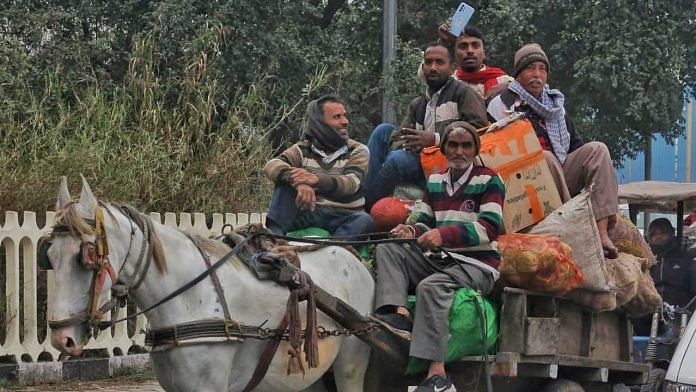The latest farmers’ protest does not seem to be any different from the one witnessed in 2021-22, especially regarding the violence aspect. While farmers from Haryana, Eastern Uttar Pradesh, and some from Rajasthan reportedly joined the protest march, a large section of the agitating farmers from Punjab seems to be more violent and show least respect for law and order. The Narendra Modi government had offered to hold talks with the agitating farmers in Chandigarh, but the farmers’ leaders insisted on reaching Delhi.
The intention of those leading the protest doesn’t appear to be about presenting the views of the farmers. The kind of equipment, fortified tractors, and elaborate arrangements for feeding large numbers clearly indicates a siege of Delhi. After the government’s strong actions in Haryana, restricting the protesting farmers’ entry into Delhi, the leadership is understood to have settled for talks in Haryana.
This time, the protesting farmers are demanding a legal guarantee for the minimum support price (MSP) for crops. The list of demands also includes increased compensation for lands taken over by the government for various projects and reservation of 10 per cent of land for farmers’ families. They seek justice for the farmers killed in the Lakhimpur Kheri incident and the dropping of all charges against protesters from the 2021-22 protest.
Holding the Union government responsible for not honouring its 2016 promise of increasing investment in rural projects to double farmers’ income by 2022, the farmers are seeking answers and assurances from the government. Interestingly, the list of demands also includes pulling out of the World Trade Organization (WTO) and withdrawing from all agricultural-related trade agreements.
The demand on WTO is unacceptable as it is crucial for India’s engagement in global trade and protecting farmers’ interests, both domestically and globally. India is likely to take a firm stand in the forthcoming 13th Ministerial Conference of WTO in the UAE, which will be attended by trade and commerce ministers from 164 countries. Besides addressing critical issues of sustainable development, India insists that the WTO keeps out of its agenda issues related to agriculture, fisheries, and e-commerce, while reiterating its commitment to global engagement. More importantly, India is keen on not addressing agricultural issues at WTO-MC-13 without a permanent solution to the public stockholding programme, crucial for food security and supporting small farmers.
Also read: Congress finally has MSP mudda against Modi. But 2 more steps to go for it to work in 2024
Nothing’s changed since 2010
There is little doubt that agriculture, despite its humble appearance, is a complex vocation exposed to high risks and low profits due to several factors, ranging from the vagaries of nature to market fluctuations triggered by supply-demand dynamics. Successive governments have tried to maintain a balance between MSP and the Consumer Price Index (CPI), which determines inflationary trends. While subsidies and MSP greatly contribute to addressing farm losses, fully meeting the farmers’ demands could result in a phenomenal increase in fiscal deficit, which is already 6.4 per cent of GDP.
The agitators’ demand to implement the report of National Commission on Farmers prepared by Dr MS Swaminathan also doesn’t seem feasible at this juncture. The commission’s suggestion on MSP was rejected by the UPA government of Dr Manmohan Singh in 2010. In a reply to a question in the Rajya Sabha, then- agriculture minister KV Thomas had said that fixing MSP at least 50 per cent more than the weighted average cost of production may “distort the market” and mechanical linkage between MSP and the cost of production may become counter-productive. The situation is no different now.
The government should talk to the farmers and suggest setting up a joint committee of experts, practicing agriculturalists, economists, and other stakeholders who could think of ways and means to address the issue of ever-increasing MSP, which has a cascading effect on inflation. An effective market price mechanism working closely with MSP could be one of the many solutions.
Meanwhile, the BJP led Haryana government has come down heavily on the agitators who have crossed all limits of civilized protest. Their intention appears to be to march to Delhi and hold the city to ransom by creating more violence and chaos, especially when election announcements are due anytime. Clearly, a large section of the agitators does not seem to represent the farming community, nor are they interested in holding talks with the government.
Before any meaningful talks, the farmers’ representatives should withdraw their agitation and make a structured representation to the government. Those leading the agitation should weed out anti-social elements and those indulging in violence. The government should have no hesitation in talking to genuine representatives of the farmers. But failure to check violence, arson, vandalism, and inaction towards wanton disruption of normal activities, as happened in 2021-22, can badly hurt the government’s image, especially in an election year.
The Modi government has asked some senior ministers to meet the farmers’ leaders and understand their demands. The government should make it clear that just as terrorism and talks, and conflicts and commerce cannot go together, violence and hurling abuses at the Prime Minister and the government cannot go together with talks with farmers.
Seshadri Chari is the former editor of ‘Organiser’. He tweets @seshadrichari. Views are personal.
(Edited by Prashant)



